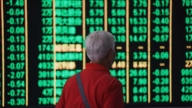【新唐人2014年09月01日讯】中国四大坏账银行之一准备上市并筹集上市前资本。中国华融资本管理公司从美国华平、高盛等投资者那里吸引了24亿美元。但是就在“华融”8月28日宣布融资的同时,去年在香港上市的另外一家中国坏账银行“信达资产管理公司”的股票,遭遇7个月来最严重的单日下滑。
坏账银行的正式名称是“资产管理公司”。中国四大资产管理公司是在90年代,中共为了剥离银行坏账而设立。四大银行各自设立一个“资产管理公司”,它们接管了占据四大银行总资产15%的坏账。“华融”为“中国工商银行”工作,“信达”为“中国建设银行”工作,“长城”为“中国农业银行”工作,“中国东方”为“中国银行”工作。
“华融”周四说,它吸引了全球80多家投资者的兴趣。最终,以24亿美元的价格,出售21%的股权,给一个包括中信证券、中金公司、中粮集团、高盛集团和美国华平在内的集团。“华融”董事长赖小民28号在新闻发布会上说,它计划今年年底之前在香港上市。
坏账银行以折扣价从巨头国有银行那里购买不良贷款,然后处理,从中盈利。大型国有银行“中国农业银行”和“中国银行”最近几天说,它们在今年头6个月分别出售了83亿元和70亿元的坏账。与此同时“华融”7月份通过出售美元债券,筹集了15亿美元。
中国最近几年冷却的经济增长,却点燃了银行系统和其他金融领域坏账的飙升,使得诸如“华融”和“信达”这样的坏账银行对于投资者更具有吸引力。
北京“天则经济研究所”所长助理段绍译表示,由于国有银行在中国处于垄断地位,“躺着就能挣钱”,所以投资者对坏账银行也很有信心。
《华尔街日报》指出,坏账银行目前已经扩大了业务范围,远远不局限于最初的不良贷款业务,现在几乎涉足这个国家所有的金融领域。比如“华融”在银行、信托金融租赁和证券等领域都拥有子公司。
天则经济研究所所长助理段绍译:“这种投资将来可能有两个很好的投资方向。第一、用来开银行,第二、用来收购不良资产。中国现在的经济形势很不好。使很多企业可能在未来不太长的时间里濒临破产倒闭。破产倒闭的话,有两种结果。第一是资产重组,第二个是贱卖资产。所以当它吸收了足够资本的时候,它就能在市场上有优先话语权,它就能优先得到好的投资机会。”
去年“信达”成为四大坏账银行当中,第一家在香港上市的公司。“信达”的股票在12月份上市之后,头两个月内上涨了50%达到5.43港元,但是在那之后,它成为香港上市的中国金融股当中表现最差的股票今年下跌18%。
段绍译指出,“信达”这些资本管理公司,实质上还是国有企业,他对所有国有企业的发展前景都不看好。
段绍译:“国有企业是没有效率的,往往是良好的动机造成可怕的结果。所以它在实际运作中,往往最终的效果还是不好。”
《金融时报》报导说,在90年代末在政府指令性借贷热潮之后,中国银行领域从技术上来说已经破产,坏账占据银行投资组合的40%。
为了解决这个问题,北京建立了“华融”和三个其它资产管理公司将1.4万亿元的不良贷款从银行账簿上剥离。政府然后注入数千亿元新的资本到银行当中,出售股份给外国投资者,最终将它们全部在香港上市,但是北京仍然维持多数股权,并实际控制银行。
中国几大银行向香港和上海证券交易所提交的,今年上半年的财报当中,都报告坏账飙升。目前,中国所有的大型上市银行的交易价格都低于账面价值。
采访编辑/秦雪 后制/李勇
Soaring Bad Debt In China Leads “Bad Banks" To Profit
One of the four bad Banks in China is raising its capital
and preparing for its market list.
China’s Huarong Capital Management Company attracted
$2.4 billion from investors such as the U.S. based
Warburg Pincus, Goldman Sachs and others.
However, when Huarong announced financing on Aug. 28,
another bad Chinese bank, Cinda Asset Management
Company, which was listed in Hong Kong last year,
suffered the worst single-day decline of stocks
over the past seven months.
Asset Management Company is the official name
for the bad bank.
China’s four asset management companies were
established in the 1990s by the CCP in order
to separate the bank bad debts.
Each of the four major banks set up an asset management
company for taking over 15 percent of bad debts
of the total assets of each major bank.
Huarong is a Commercial Bank of China,
Cinda a China Construction Bank,
Great Wall an Agricultural Bank of China,
and China Oriental a Bank of China.
Last Thursday, Huarong said that it had attracted
the interest of more than 80 global investors.
Eventually, it sold a 21 percent stake for $2.4 billion
to a consortium which is comprised of the CITIC Securities,
China international Capital Corporation,
China Oils & Foodstuffs Corporation,
Goldman Sachs Group and the US-based Warburg Pincus.
On Aug. 28, the Chairman of the Board of Huarong Company,
Lai Xiaomin, said on a news conference that the company
was scheduled to be publicly listed in Hong Kong
before the end of this year.
Bad banks buy bad loans from the giant state-owned banks
at a discount, and then profit off of the bad loans.
Large state-owned banks such as Agricultural Bank of China
and Bank of China, said a few days ago sold 8.3 billion Yuan
and 7.0 billion Yuan bad debts, respectively,
during the first six months of this year.
At the same time, Huarong raised $1.5 billion
in July by selling U.S. bonds.
China’s economic growth slowed in recent years,
but this ignited a surge in bad debts of the banking system
and other financial areas, making bad banks such as
Huarong and Cinda more attractive for investors.
Mr. Duan Shaoyi is the assistant of the Director
of Beijing-based Unirule Economics Institute.
He said that due to the monopoly status of state-owned
banks in China, “lying down can also make money."
Investors are also very confident in bad banks.
According to a Wall Street Journal report, currently the bad
banks have expanded their business scope far beyond
the initial non-performing loans, and now involve
nearly all of the financial sectors of the countries.
For example, Huarong Company has its own
branch companies in the areas of banking,
trust, financial leasing and securities.
Duan Shaoyi: “Such an investment in the future could be
diverted into two very good investment directions.
The first direction is to open a bank, and the second
is for the acquisition of non-performing assets.
China’s current economic situation is very poor, which might
push many Chinese companies into the verge of bankruptcy
in the coming years without a long time.
If many companies declare bankruptcy,
then there are two possible results.
The first is the reorganization of the assets,
and the second is the fire sale of the assets.
So once a bad bank absorbs enough capital,
it will be able to have prioritized speech rights
on the market, it can give priority
to good investment opportunities."
Last year Cinda become the first publicly listed bad bank
in Hong Kong of the four Chinese bad banks.
During the first two months after Cinda was listed
last December, its stock rose 50 percent to HK $5.43,
but after that, it became the worst performing stock
of Hong Kong-listed Chinese financial stocks.
It fell 18 percent this year.
Duan Shaoyi noted that comparible companies to Cinda
assets management are in essence state-owned enterprises,
and he was not optimistic on the development prospects
of all state-owned enterprises.
Duan Shaoyi: “State-owned enterprises have no efficiency.
It is very usual for a good motivation of state-owned
enterprises to produce dire results.
So in the actual operation, the final result is often not good."
Financial Times reported that in the late 1990s,
after the mandatory governmental lending boom,
the Chinese banking arena had already been technically
bankrupt.
The bad debts accounted for 40 percent
of the portfolio of the bank system.
To solve this problem, Beijing established Huarong
and three other asset management companies,
and peeled 1.4 trillion yuan of bad loans
from the state-owned banks books.
The government then injected hundreds of billions
of new capital into banks, sold shares of these banks
to foreign investors, and ultimately all of them were listed
in Hong Kong.
However, Beijing still maintains the majority of stake
and the actual control of these banks.
According to the financial reports of a few major
Chinese state-owned banks submitted to Hong Kong
and Shanghai Stock Exchanges in the first half of this year,
the bad debts soared.
At present, the transaction prices of all the major listed
Chinese banks are lower than the book values.
Interview & Edit/QinXue Post-Production/LiYong



























